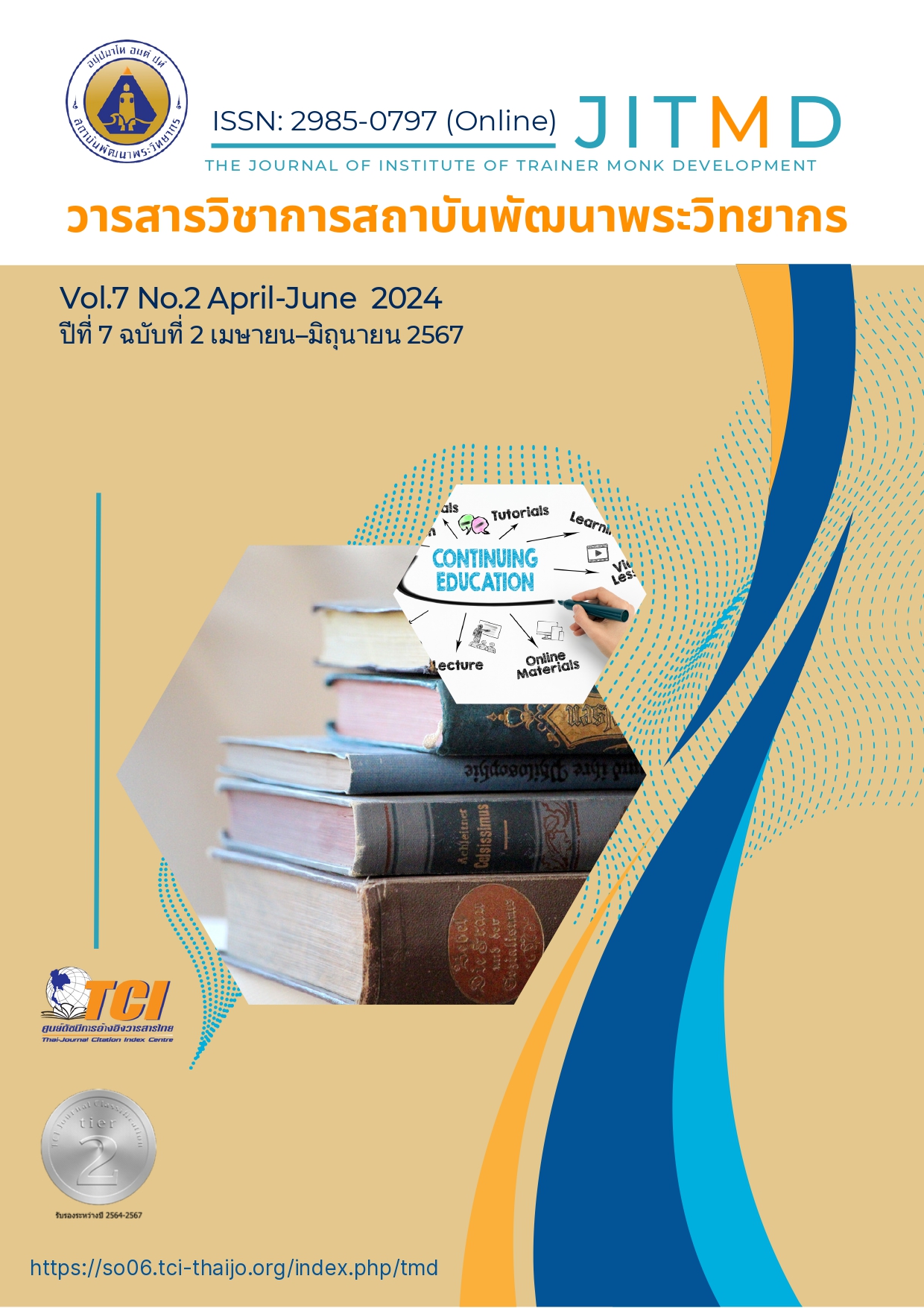The Comparison of English Learning Achievement on the Topic of “Clauses of Purpose” Through the Uses of the Task-Based Learning and the Conditional Teaching Method for Mattayomsuksa 4 Students
Main Article Content
Abstract
The objectives of this research were 1) to compare the scores of English learning achievement between the use of Task-Based learning and the conditional teaching method. 2) to compare the scores of English learning achievement before and after teaching by using Task-Based learning and 3) compare the scores of English learning achievement before and after teaching by using the conditional teaching method. The samplings in this research were 80 students, consisting of 2 groups from Mattayomsuksa 4 students of English-Chinese programs, enrolled in the first semester of the 2023 academic year. The samplings were purposive sampling method for the present study. The research instruments were 1) the lesson plans based on Task-Based learning and the conditional teaching method and 2) English learning achievement test. The data was analyzed by using the paired sample t-test, independent t-test, Mean, and Standard Deviation. The findings were as follows: 1) the scores on English learning achievement between the use of Task-Based learning and the conditional teaching method displayed differences at a statistically significant level of .05 2) the scores on English learning achievement before and after teaching by using Task-Based learning after the completion had higher than prior at the statistically significant level of .05 and 3) the scores on English learning achievement before and after teaching by using the conditional teaching method after the completion had higher than prior at the statistically significant level of .05.
Article Details

This work is licensed under a Creative Commons Attribution-NonCommercial-NoDerivatives 4.0 International License.
บทความที่ได้รับการตีพิมพ์เป็นลิขสิทธิ์ของวารสารวิชาการสถาบันพัฒนาพระวิทยากร
ข้อความที่ปรากฎอยู่ในบทความที่ได้รับการตีพิมพ์ในวารสาร ถือเป็นความรับผิดชอบของผู้เขียนบทความ และข้อคิดเห็นนั้นไม่ถือว่าเป็นทัศนะและความรับผิดชอบของกองบรรณาธิการวารสารวิชาการสถาบันพัฒนาพระวิทยากร
References
กระทรวงศึกษาธิการ. (2551). หลักสูตรแกนกลางการศึกษาขั้นพื้นฐาน พุทธศักราช 2551. กรุงเทพฯ: โรงพิมพ์คุรุสภา.
วรางคณา แสงธิป. (2564). “การพัฒนาการจัดการเรียนรู้แบบเกมมิฟิเคชันร่วมกับวิธีการสอนแบบเน้นภาระงาน เพื่อส่งเสริมความสามารถในการอ่านภาษาอังกฤษเพื่อความเข้าใจและแรงจูงใจในการเรียน ของนักเรียนชั้นมัธยมศึกษาปีที่ 3.” วารสารเทคโนโลยีและสื่อสารการศึกษา, 22: 32-47.
สุพรรณี อาศัยราช. (2558). การพัฒนาผลสัมฤทธิ์ด้านการอ่านภาษาอังกฤษโดยการใช้กิจกรรมเสริมแบบเน้นภาระงาน. กรุงเทพฯ: มหาวิทยาลัยเทคโนโลยีราชมงคลสุวรรณภูมิ.
อรุณี วิริยะจิตรา และคณะ. (2555). เหลียวหลังแลหน้า การสอนภาษาอังกฤษ. กรุงเทพฯ: บริษัท สำนักพิมพ์หน้าต่างสู่โลกกว้าง จำกัด.
Al Muhaimeed, Sultan A. (2013). Task-Based Language Teaching VS. Traditional way of English Language Teaching in Saudi Intermediate Schools: A Comparative Study. Dissertation. Kent State: University College of Education, Health, and Human Services.
Atefeh Hadi. (2012). “L2 Teachers' and Learners' Perceptions of Task-Based Language Pedagogy: Voices from Iran.” LAP LAMBERT Academic Publishing: Germany.
Harmer, J. (2001). The Practice of English Language Teaching (3rd ed.). Harlow: Longman.
Leaver and Jane R. Willis, editors. (2004) Task-based instruction in foreign language education: Practices and programs. Washington, DC: Georgetown University Press.
Nunan, David. (2004). Task-Based Language Teaching: A Comprehensively Revised Edition of Designing Tasks for the Communicative Classroom. United Kingdom: Cambridge University Press.
Rad & Bakhash. (2015). Study Tasks in English. Cambridge: Cambridge University Press.
Willis, Dave & Willis, Jane. (2007). Doing Task – Based Teaching. New York: Oxford University Press.


